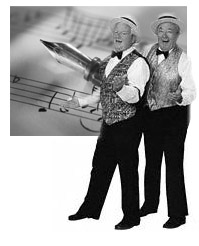
The Two Folksingers
| Ïðîäàæè | ||||
| Sales.com | ||||
| Providing... | ||||
by Graham Denton
Even in these days of highly customized solutions, it's hard for salespeople to shed the old delusion that success is basically the result of having the best product. This belief remains most common in high–tech arenas, where because of product sophistication we're often tempted to respond to an RFP by riffling through our catalog of components and telling the customer, Chinese menu style, "You need one from Column A and two from Column B." In other words, "Here's what we have to sell you, which therefore must be what you need."
 If
you doubt that this product–driven sales approach can be self–destructive,
listen to the following story of two competing folksingers. I heard it
from a genial English professor as we shared some R&R time in a Memphis
hotel lounge. He was talking about his interest in traditional music and
about the old–time folksong circuit near his East Coast home. "Does anybody
actually make a living singing folksongs?" I asked.
If
you doubt that this product–driven sales approach can be self–destructive,
listen to the following story of two competing folksingers. I heard it
from a genial English professor as we shared some R&R time in a Memphis
hotel lounge. He was talking about his interest in traditional music and
about the old–time folksong circuit near his East Coast home. "Does anybody
actually make a living singing folksongs?" I asked.
"Some do," he said, "and some don't. It depends pretty much on the flexibility of your repertoire. Some singers are willing to perform almost any kind of traditional music, while others are single–genre types, catering mostly to very specialized audiences."
When I asked for an example, the professor mentioned two New Jersey singers with about the same level of singing and playing ability. " One of them specializes in South Jersey traditional music. He's got a huge repertoire of old Jersey tunes, but that's all he'll perform. It isn't that he couldn't sing " Red River Valley" if somebody requested it, but he chooses not to. He's completely devoted to that single kind of music.
"The other guy sings anything, anywhere, anytime. Cowboy tunes, sea chanteys, children's songs. He was once asked to perform Bulgarian folksongs at a local club. It took him two weeks of research, but he did the job. There are some folksong followers who condemn him as inauthentic, but he really doesn't care. He'll do whatever it takes to satisfy the audience, and he always working."
"What
about the one–type–of–music guy?" I asked.
"Is there much of a demand for Jersey–only music?" "Not much," admitted
the professor. "The last I heard, he was substitute teaching at a local
high school."
You don't need a Ph.D. to draw a sales lesson from this story. The Jersey–only singer lost his market, and his job, not just because of his intense overspecialization, but because he was telling his audiences, in effect, "It's not about you, or about what you'd like to listen to. It's about the product I've perfected. Take it or leave it."
The only place you can survive with this kind of "product first" attitude is where you have (a) the "perfect" product for a given market, (b) a customer base that never alters its taste or solution requirements, and (c) no competition. I'm not sure where these conditions prevail, but it's not on this planet.